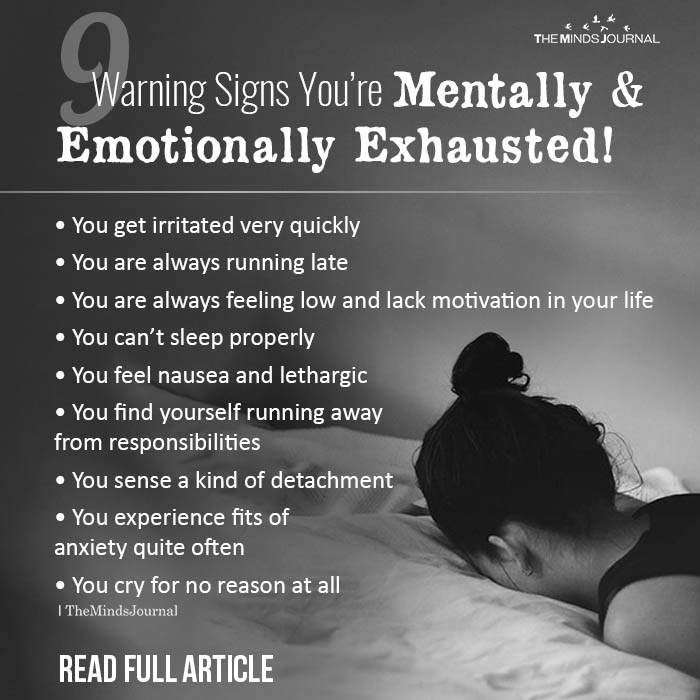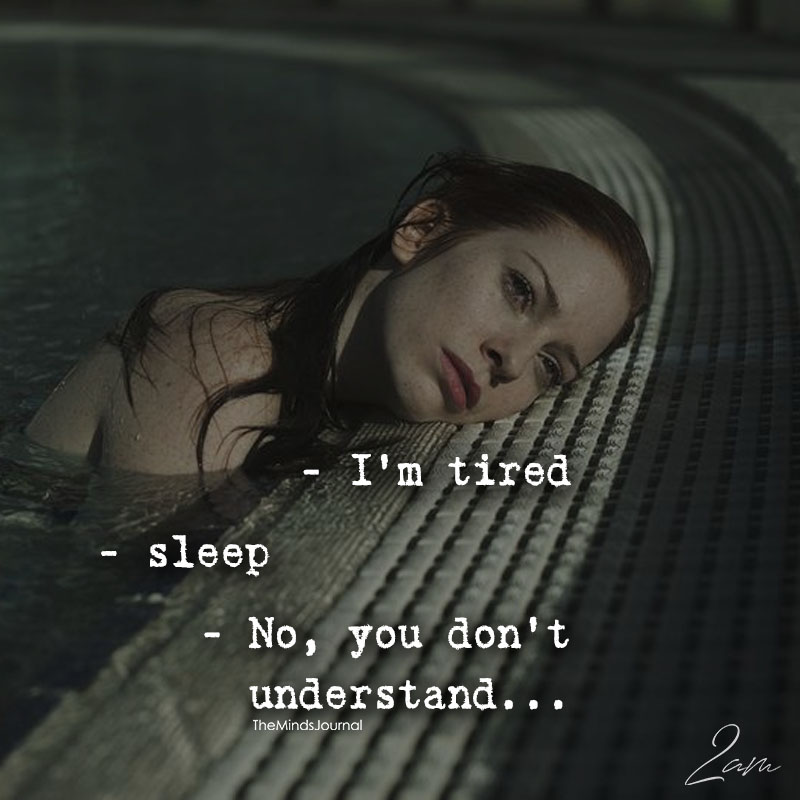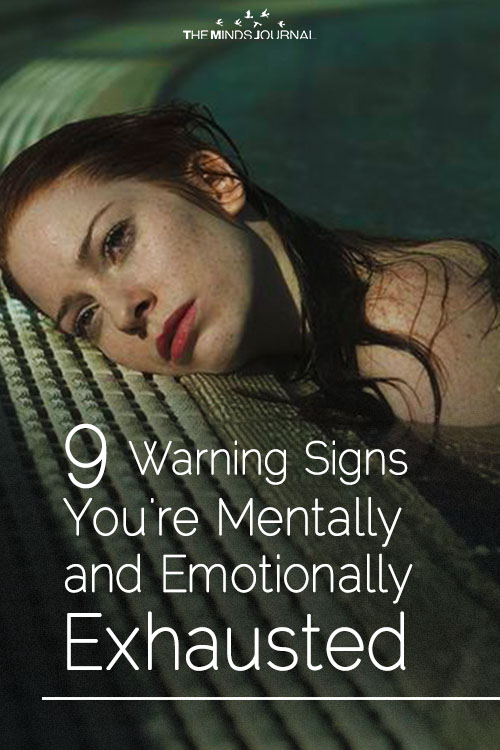When you feel mentally and emotionally exhausted, you might not always know it, but it will manifest in the form of a few warning signs. You will feel extremely tired and overwhelmed most of the time, but you will go on because isn’t that what life is? No matter what happens, you have to “power through”.
“We all grow tired eventually; it happens to everyone. Even the sun, at the close of the year, is no longer a morning person.” ― Joyce Rachelle
Do you feel easily fatigued?
Are you sleeping too much or too little?
Do you wake up every morning tired and exhausted even though you’ve slept well?
When we are living a busy and stressful life, it can often feel overwhelming. We hope that our life will change for the better but instead, things seem to keep getting worse. Whether it’s your work, family, a difficult partner, or even a bad habit that you can’t kick, prolonged stressful situations can lead to mental and emotional exhaustion, also known as a burn-out.
Burnout is a state of mental and emotional exhaustion that may be caused by prolonged and excessive stress. It makes you feel emotionally drained, worn-out, and overwhelmed all the time.
When you’re mentally and emotionally exhausted, you feel trapped or stuck as if you have no control over your life. Burnout can not only affect your career, relationships, and the normal flow of life, but this chronic state can also even damage your health in the long run and severely affect your quality of living
This is why we must learn to identify the signs of a burnout and take steps while there is still time.
10 Warning Signs You’re Mentally and Emotionally Exhausted

1. You constantly feel tired.
Unlike normal tiredness, fatigue makes you feel exhausted from the inside. You feel like no amount of sleep or coffee can make you feel better. Your energy levels have hit an all-time low and don’t seem to get better.
Related: Warning Signs of Extreme Mental and Emotional Exhaustion
2. You get irritated easily.
You get annoyed by even the smallest things. You only see negativity around you and you constantly feel irritated. You lose your temper over insignificant matters. You are highly sensitive to the negativity surrounding you and it makes you feel hopeless.
3. You lack motivation.
Lately, you feel like you have lost faith in life. Nothing seems to motivate you to make an effort to live better. You don’t have the will to get things done and you constantly struggle to find the necessary motivation.
4. You are always running late.
You are never on time for anything. You are late all the time as you lack the motivation to do anything. Nothing really matters to you so being punctual seems unimportant now. You don’t even have time for yourself anymore.
5. You experience anxiety attacks.
You experience fits of anxiety quite often. As you get irritated by even the smallest things, anxiety attacks have become a daily experience. You become unnecessarily worried and feel even more tired and exhausted.
Related: Burnout: 6 Signs You’re Ready To Hit The Wall
6. You run away from responsibilities.
Although you don’t avoid responsibilities deliberately, you just feel too drained of energy by all the burden and stress. You feel like a victim and you just cannot take it anymore.
7. You feel detached & isolated.
You feel a kind of detachment from everything and everyone in your life. You don’t get affected by anything anymore. You don’t feel any strong emotions and there is a numbness inside. You feel isolated from your emotions and the world around you.

8. You feel nauseous and lethargic.
Nausea, lethargy, and dizziness are signs that you are too tired and need rest. This means your mind and body are experiencing a mental and emotional breakdown due to excessive stress.
9. You cry for no reason at all.
Getting affected by the smallest things makes you tear up easily. With mental and emotional exhaustion, we lose our ability to cope with challenging situations. This intensifies the stress and makes you teary-eyed for no reason at all. The tears are from all the pain you are holding inside.
10. You can’t sleep properly.
It’s hard for you to sleep even though you feel mentally, physically, and emotionally exhausted. It is difficult for you to calm your thoughts and fall asleep. No matter how long you lie in your bed, your thoughts keep rushing in your mind making insomnia a bad habit you can’t kick.
Can you identify with most of these signs of a burnout? Don’t worry!
Emotional exhaustion is a treatable condition.
Related: Psychic Burnout in Empaths and HSPs: How Full Is Your Well?
If you are feeling overwhelmed all the time, then there are a few things you can do to make things better. Small changes in your daily habits can help you manage and prevent burnout.
Here are a few things you can do.
1. Remove the stressor.
Eliminate the cause of your emotional exhaustion. Identify the stressor and take steps to change the situation in your favor. There is always something you can do to make things better. You’re never helpless.
2. Practice mindfulness.
Mindfulness techniques have been recognized as scientifically to reduce stress and anxiety. Mindfulness means bringing your awareness to the present moment. Practice mindfulness to move your attention away from negativity.
3. Talk to a friend you trust.
Sharing your difficult emotions with a trusted friend can help a lot in relieving stress. They don’t have to offer you any solutions. They simply need to listen to you without any judgments.
Related: 5 Signs That Say You Need Emotional Healing
4. Seek professional help.
Consulting a therapist will help you gain the tools to work with your mental and emotional burnout. Cognitive-behavioral therapy (CBT) and applied relaxation techniques can help a lot.
Do not allow negativity to overshadow you.
Identify the warning signals of burnout and figure out how you can eliminate the stressors to recharge yourself, gain back your energy, and your will to live.
Self-love is what you need most at this time.
Are you feeling mentally and emotionally drained?
What are you doing to make yourself feel better?
We would love to know about your thoughts and experiences with mental and emotional exhaustion. So feel free to share your opinions below.
Frequently Asked Questions (FAQs)
How do you get over mental burnout?
Burnout ranges, and people experience it differently. You need to evaluate how emotionally exhausted you are. This is an important starting point, then you can start building a support group or take part in activities you enjoy to focus on yourself!
How do you treat mental and physical fatigue?
There are many ways you can treat mental and physical fatigue, for instance, having a nutritious meal, getting enough sleep, exercising or writing your feelings in a journal.
Does emotional healing make you tired?
You do become emotionally exhausted during emotional healing. Your mind and body react in a variety of ways to emotionally distressing experiences. So take your time, don’t stress too much.
How do you reverse mental exhaustion?
Take regular breaks. Whether it’s a 15-minute break, a weekend getaway, or a workcation, giving yourself time to unwind may work miracles for you.











Leave a Reply